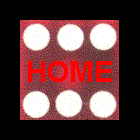| When the first mass produced twenty-sided die
was released it served triple duty First it was used as a d20 Second it was used as a ten-sided die (d10) Third ... in pairs ... it was used for percentile rolls (1-100) * The first generation d20s were numbered 0-9 twice with each number opposing its twin ... To use the die as a d20 the user had to color one set of the 0-9 numbers to differentiate it from its twin ... when rolled the roller had to say which 'color' was high (ie add 10 to the roll) EXAMPLES: If a red d20 has one set of 0-9 colored black and before the roll ... black is called 'high' ... a roll of a black 7 results ... the value would be 17 (7 + 10 for being black) If the roll had been an unmarked (red) 0 ... the value would be a 10 if the roll had been a black 0 ... the value would be a 0 * D10's were simulated using first generation d20's by ignoring the color of the number ... if either 7 was rolled the value would be a 7 ... if either 0 was rolled the value would be a 10 * The first generation d20's were used to generate percentile rolls by choosing two d20's (usually of two different colors) and designate one of the two to be the 'high' (10's digit) die ... for this case the dice are read for their face values EXAMPLES: Using a pair of d20s one red and one blue with the blue die being called 'high' before the roll ... the red die rolls a 7 and the blue die rolls a 9 ... the percentile roll would be a 97 If both dice roll a 0 then the percentile roll is a 100 The second generation d20 was numbered 1-20 and was seldom used as either as a d10 or for percentile rolls as the d10 was available at that time |
WHEN WOULD A D20 BE USED?
| Dungeons and
Dragons: The d20 is used to generate 'to hit' (success or failure in combat) or 'saving throw' (success or failure of resistance to a negative effect) rolls |
|
EXAMPLES Click on thumbnail for larger photos |
|
|
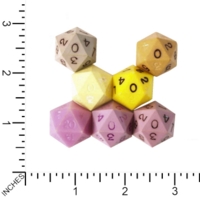 |
When
d20's
were first released they were sharp edged opaque icosahedrons These dice were numbered 0 thru 9 twice |
|
|
|
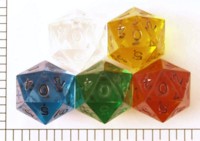 |
Not long
after came sharp edged translucent or clear icosahedrons These dice were numbered 0 thru 9 twice |
|
|
|
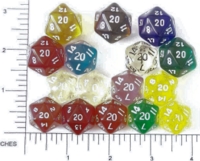 |
Next
came
second generation d20's (1-20) They were rounded or 'European' style icosahedrons |
|
|
|
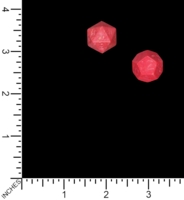  |
Sharp edged icosahedrons numbered 1 to 20 took a while longer to be released |
|
|
|
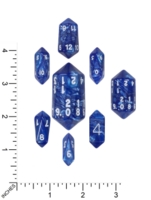 |
The final
and most radical change to the d20 came when  Introduced their Crystal d20 |
|
|
|
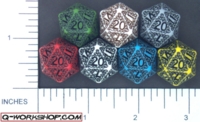 |
Here are
many more examples of these types of dice Glitter ... Swirl ... Two Tone ... Iridescent they are all here |
